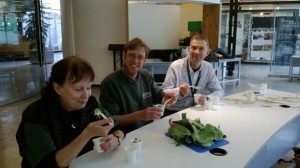Now that harvest is a major activity in the Demonstration Garden the final crops in the Really Wild Veg project are approaching maturity. This project has been growing Crop Wild Relatives alongside their domesticated cousins to see how the process of domestication has changed the plants.
An important element of the project has been to assess the nutritional quality of the crops. Plants produce chemical compounds called ‘phytochemicals’ that can be active in preventing diseases like cancer, heart disease and diabetes. What the research scientists at the Rowett Institute of Nutrition and Health are interested to know is whether domesticated crops have the same concentrations of these beneficial phytochemicals. Comparing familiar crops with their wild relatives in this way is something that has rarely been done. The Really Wild Veg project has the potential to increase our knowledge on key plant nutrients in the human diet.
Today the volunteers at the Edible Gardening Project, who have been running the project, got together to taste the cabbages that are the final part of the trial. With each Crop Wild Relative a comparison was made with a heritage variety and a modern F1 hybrid variety. What was quite obvious is that the three different cabbages tasted different despite being grown side by side. The strongest flavour was found in the wild cabbage, although this was not always the favourite. This time the heritage variety narrowly polled the most votes.
The visitors attending the Harvest Festival on Sunday 22nd September will have an opportunity to taste the three cabbages for themselves and cast their vote for the best flavoured.
For more information on the crops being grown see the earlier updates:

